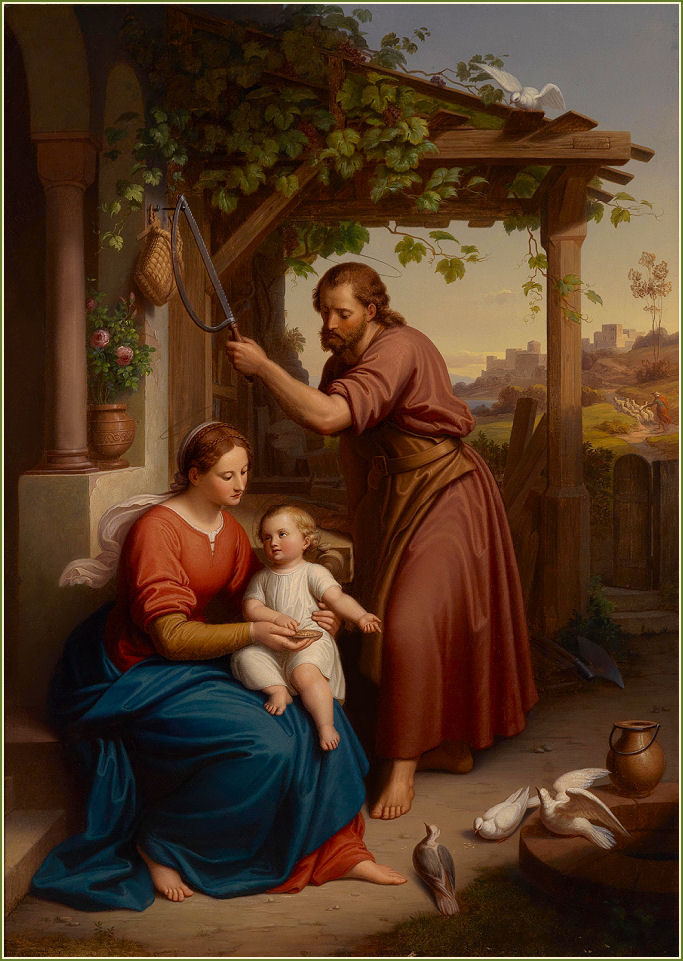  THE COMMANDMENTS Taken from THE CATECHISM EXPLAINED Written by Fr. Francis Spirago; Edited by Fr. Richard Clarke, SJ with Nihil Obstat and Imprimatur, New York, 1927  SECTION B: THE TEN COMMANDMENTS THE FOURTH COMMANDMENT OF GOD In the Fourth Commandment God enjoins upon us to honor His representatives upon earth, that is to say, our parents, and both the ecclesiastical and secular authorities. 1. OUR DUTY TOWARDS OUR PARENTS 1. Our parents are to be honored, because they are God's representatives and our greatest benefactors. We are all children of Our Father in Heaven, and He causes us to be fed and brought up by our earthly parents. Thus parents take the place of God in regard to the education of their children; they are His representatives, and as such, the honor due to Him must be paid to them, for the viceroy can claim the same respect as the monarch who has delegated his authority to him. Those who despise their parents, despise God Himself. St. Augustine, after his conversion, bitterly regretted the disrespect he had shown the mother God had given to him, knowing that thereby he bad shown disrespect to God. Our parents are moreover our greatest benefactors. "How much," exclaims St. Ambrose, "has not thy mother suffered on thy account! How many sleepless nights, how many privations, how much anxiety has she not borne for thee! How hard thy father has worked, to provide thee with food and raiment! And canst thou be ungrateful to those who have done and suffered so much for thee?" The Son of God Himself honored His Mother and His foster-father; it is said of Him that He was subject to them. Learn of Him to obey your parents; He honored them, though they were His servants; He loved and respected His Mother, whose Creator He was; He never forgot that as an infant He had lain on Mary's bosom, and had been carried in Joseph's arms. 2. We ought to honor our parents by respectful behavior, love, and obedience. When God bids us honor our parents, He commands us to love and obey them, for this is included in the reverence we owe them. Love is due to them as our greatest benefactors. It is the first duty of a Christian to compensate his parents for the trouble and the sacrifices his education has entailed on them. The obligation to obey them ceases when there is no longer occasion for it; the duty of loving and respecting them only ends with their life. Respect towards our parents consists in esteeming them from our heart as God's representatives, and manifesting this esteem outwardly by word and deed. Esteem for our parents must be heartfelt, otherwise outward manifestations of esteem would be mere dissembling. Christ showed great respect for His Mother at the marriage feast of Cana; for although He told her His hour for working miracles was not yet come, He complied with her request. We must honor our parents even if they are poor and in a humble class of life. Joseph, when Governor of Egypt showed great respect for his aged father. Although he was only a shepherd, he brought him to the king and presented him before him (Gen. xlvii. 7). King Solomon rose from his throne to meet his mother, although she was not of royal lineage; he bowed to her, and made her sit on his right hand (3 Kings ii. 19). Pope Benedict XI received his mother, who was a poor washerwoman, in the kindest manner when she went to him in the mean apparel of her class. Even if parents do not lead a virtuous life, they still have a claim upon the respect of their children, because of the position they hold in regard to them as God's representatives. The Wise Man says: "Honor thy father in word and work and in all patience" (Ecclus. iii. 9). Love of our parents consists in kind feelings and kind actions towards them. We are bound to love our parents, as we are bound to love all men, because they are our neighbor, made in God's image. But this is not enough: They have a right to a special affection on our part, because we are their children, because they love us so tenderly; and confer so many benefits upon us. Are not his parents a child's best friends? Love consists in kind sentiments and kind actions. Joseph showed his affection for his old father; he fell on his neck and embracing him, wept (Gen. xlvi. 29). But kind feelings are not enough. Let us not love in word nor in tongue, but in deed and in truth (1 John iii. 18). Therefore we ought to help our parents in destitution or sickness, and pray for them. The Prussian General Ziethen when a page, was once on guard at night in the king's antechamber. The king, Frederick I, finding he did not answer his summons, went out and found him asleep over a letter which he was writing to his mother, to send her his first earnings (thirty shillings) in the royal service. The king read the letter and was so touched that he put a roll of money in each of the young man's pockets, and the next morning appointed him to the army. When Blessed Thomas More had been put to death for the faith by order of Henry VIII, no one ventured to bury his remains; his daughter Margaret alone braved the tyrant's wrath, and he, respecting her filial devotion, allowed no one to interfere with her. Even among the lower animals we find examples of affection towards parents. The young lions share their prey with the old, and the storks warm those who have lost their plumage through age; they bring them food and assist them to fly. The Wise Man says: "Son, support the old age of thy father" (Ecclus. iii. 18). Remember how Our Lord on the cross provided for His Mother by commending her to the care of St. John (John xix. 26). Obedience towards our parents consists in fulfilling all their lawful commands, as long as we are under their authority. "Children, obey your parents in all things" (Col. iii. 20). Just as parents are bound to provide for the education of their children, so it is the duty of children to obey their parents. As in the State some rule and others obey, so it must be in the family; otherwise there can be no domestic order and concord. Virtue is expected of the old; submission of the young. Yet children are only bound to obey when the command is just; if their parents order them to do what is contrary to God's law, and consequently unjust, they must act on the Apostle's words: "We ought to obey God rather than men" (Acts v. 29). St. Hermengild, son of Leovigild, King of the Goths, was imprisoned by his father in a tower in Sevilla, because he would not embrace the Arian heresy. The king promised to restore him to his favor if only he complied with his desire. But the Saint replied that he would renounce the crown, his father's affection, life itself, rather than deny his faith. He was accordingly Martyred. Several other Saints chose rather to disobey the command of their earthly than of their heavenly Father, and thus lost their lives. Parents who require their children to do what is forbidden by the law of God, undermine their own authority; they saw off the bough on which they are sitting. A man ordered his son to work in the fields on Sunday; the lad refused, saying it was forbidden by the law of God. The father rejoined angrily: "You are not a child now, and the commandments are only for children." "In that case," the son replied, "I need hot keep the Fourth Commandment which bids me obey you." Children are only bound to obey their parents as long as they are under their control, and they are only bound to obey in matters which come within the sphere of the parental authority, such as their manners and behavior at home and abroad, their companions, etc. Parents have no right to dictate to their children in regard to the calling they shall embrace, for a vocation comes from God. Parents cannot dispose of their children's future, when they are no longer subject to them. St. Francis of Assisi would not let his father make a merchant of him; St. Rose of Lima refused to marry. Yet the advice of parents should always be asked; age gives them greater discernment and experience of life, and they are the best and wisest counselors a man can have. Holy Scripture exhorts us thus: "My Bon, hear the instruction of thy father" (Prov. i. 8). 3. Our duty is the same in regard to those who are in authority over us, as it is to our parents; our teachers and governors, masters and employers, and our elders in general. The old are to be respected by the young. "Honor the person of the aged man, and rise up before the hoary head" (Lev. xix. 32). It becomes the elder to speak first (Ecclus. xxxii. 4). The Spartans entertained great respect for the aged; when an old man could not find a place at the Olympian games, they all rose up to give him a seat. Alexander the Great was one day sitting by a warm fire, when he saw an aged soldier shivering in the cold; he called him in and gave him a place on his own regal couch. Young people ought to heed the counsels of the old, "for of them they shall learn wisdom and instruction" (Ecclus. viii. 9). The old act less on impulse, and consequently more prudently. God appointed a council of seventy ancients for the guidance of the Jews (Exod. iv. 29), and the Roman Senate was composed of old men. Above all, the aged should never be despised, for we too shall become old in our turn (Ecclus. viii. 9). Their infirmities must be borne with: "An ancient man rebuke not, but entreat him as a father" (1 Tim. v. 1). Transgressions of the Fourth, Commandment 1. He transgresses the Fourth Commandment of God who is disrespectful towards his parents; who behaves rudely to them, is ashamed of them, etc. Cham mocked at his father, when he lay naked and drunk in his tent (Gen. ix.). For this his father cursed him; his descendants are the inhabitants of Africa, who know not the true God. 1. He who is unkind to his parents, who, for instance, hates them, refuses to help them, steals from them, etc. The sons of Jacob, after they had sold their brother Joseph, deceived and grieved their father (Gen. xxxvii). Absalom spoke against his father at the palace gates, lied to him, and rebelled against him (2 Kings xv.). 2. He who disobeys his parents, and will not be corrected by them, transgresses this commandment. The two sons of the high priest Heli disobeyed their father's commands and admonitions (1 Kings ii.). How Does God Reward the Observance of the Fourth Commandment?' 1. God promises long life, happiness, and blessings upon earth to children who honor their parents. At the giving of the law on Sinai God promised long life as the reward for keeping the Fourth Commandment (Exod. xx. 12). St. Paul holds out the same inducement to the fulfillment of filial duty (Eph. vi. 3). Joseph was obedient to his father; the old man loved him for it but his brethren hated him. Joseph was made Governor of Egypt, and attained the age of a hundred and ten years (Gen. 1.). Those who honor their parents honor old age; and as in the providence of God there is generally some connection between the work and the reward, dutiful children usually reach an advanced age. A long life is a great boon to a man; the longer he lives, the more merits he can amass for eternity. Under the Old Dispensation a long life shortened the sojourn of the soul in limbo, consequently it was a greater privilege than under the New Dispensation, when a good death is an immediate transition to eternal life. Certainly many good children die young, but even in this case God fulfills His promise, for instead of life on earth He gives them life eternal, which is far more to be desired. Besides an innocent life is in itself a long life; "a spotless life is old age" (Wisd. iv. 9). God takes many a one out of this world that he may escape contamination: "lest wickedness should alter his understanding" (Wisd. iv. 11). Moreover the blessings which parents invoke upon their children are very powerful. Witness the blessing which the aged Tobias gave to his son when he set out on his journey; the blessings which Noe pronounced upon Sem and Japheth. Honor your parents that their blessing may rest upon you, "The father's blessing establisheth the houses of the children" (Ecclus. iii. 11). "He that honoreth his mother is as one that layeth up a treasure" (v. 5); "The relieving of thy father. shall never be forgotten" (v. 15). Hence it comes that dutiful children are generally prosperous, or at least have real contentment. The enjoyment of happiness and peace is more to be desired than wealth. Those who behave well to their parents are blessed in their turn with dutiful children, who are a comfort to them. "He that honoreth his father shall have joy in his own children" (v. 6). Happiness in this world and in the next is the reward God bestows upon children who honor their parents. 2. God threatens to send upon those who do not honor their parents shame upon earth, a miserable end, everlasting damnation. It is unquestionably a great sin to treat one's greatest earthly benefactor with ingratitude, and because of the magnitude of the sin the punishment is proportionately heavy. Those who forget their father and mother God will forget, and allow them to suffer reproach (Ecclus. xxiii. 18,19). As a tree on which there were no blossoms can produce no fruit, so the man who was disobedient in his youth will not be honored in his old age. Bad children frequently come to a miserable end; witness the death of the two sons of Heli ,who perished in battle (1 Kings iv. 11), also the fate that overtook the treacherous Absalom, who, having rebelled against his father David, and defeated him, was caught by his long hair in the branches of an oak, and hung there, pierced by three lances (2 Kings xviii.). Bad children are in great danger of losing their souls. If God deals so severely in the Day of Judgment with those who have failed to perform works of mercy towards their neighbor, how much the more rigorously will He judge those who have been unkind to their own parents. The Apostle says that those who are disobedient to parents are worthy of death (Rom. i. 30). The Jewish law pronounced a curse upon him who honoreth not his father and mother (Deut. xxvii. 16). Again, "He that striketh his father or mother shall be put to death " (Exod. xxi. 15). "The eye that mocketh at his mother, let the ravens pick it out and the young eagles eat it" (Prov. xxx. 17). God laid this strict command upon the Jews: "A stubborn and unruly son, who will not hear the commandments of his father and mother, and slighteth obedience; the people of the city shall stone him and he shall die. that all Israel hearing it may be afraid" (Deut. xxi. 18, 21). Those who have not honored their parents, by Divine retribution often have unruly children of their own, as experience frequently shows. "By what things a man sinneth, by the same he is tormented" (Wisd. xi. 17). Cham despised his father, and his descendants were the degraded nations whom God caused to be cast out of Chanaan.   HOME------------------------------------TRADITION www.catholictradition.org/Tradition/commandment4.htm |